In his ninth decade, the JA, gay rights and ‘Star Trek’ icon can’t, won’t slow down.
By George Toshio Johnston, Senior Editor, Digital & Social Media
‘To the moon, Alice!’
‘Up, up and away!’
‘How-deeeee!’
‘Engergize.’
‘Flame on!’
‘Hey now!’
‘Oh my!’
If you’re a pop culture buff, then those catchphrases may evoke a memory, a chuckle or some sort of instant recognition, whether it’s of Ralph Kramden, Superman, Minnie Pearl, Capt. Kirk, the Human Torch or Hank Kingsley from “The Larry Sanders Show.”
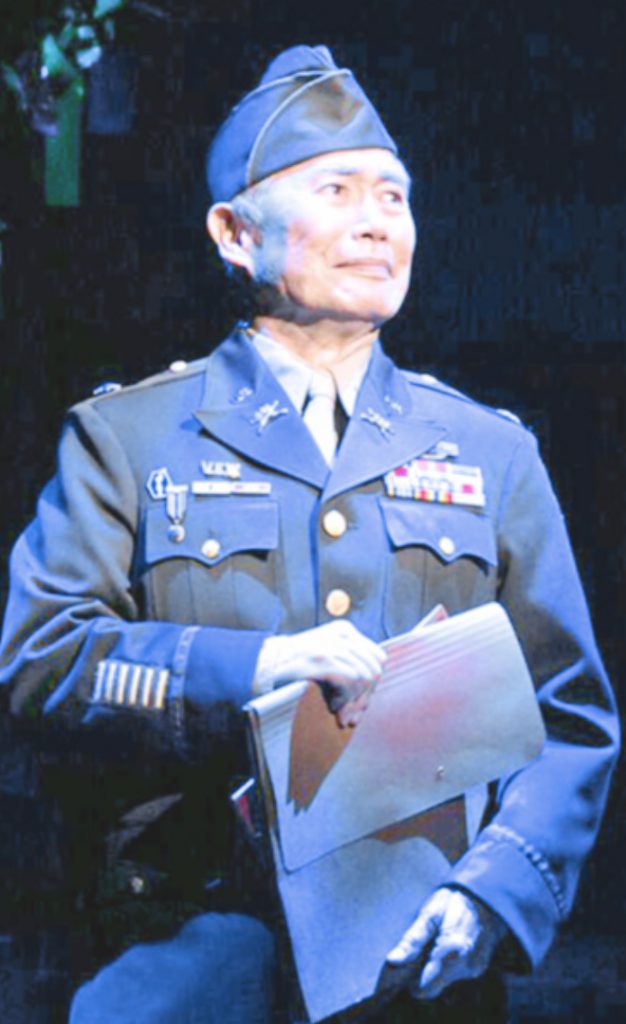
George Takei as the elderly version of Sam Kimura in “Allegiance.” (Photo: Matthew Murphy)
But only that last one is connected to an actual person: George Takei, who without a doubt is the most-recognizable and well-known living Japanese American in the universe. One simply cannot say, “Oh my!” without Takei’s stentorian baritone calling to mind. For that, he can thank a years-ago appearance on Howard Stern’s radio show.
Funny thing is, “Oh my!” becoming so associated with Takei was never planned. He says it’s a phrase he’s used all his life. His first Stern show appearance was when he was in New York to plug his role in playwright Philip Kan Gotanda’s “The Wash.” When Takei heard the show while in the waiting room, he was initially taken aback by the radio flibbertigibbet’s raunchy humor.
When they met, Takei was immediately confronted with an outrageous comment, which is par for the course with Stern. Takei asked, “Are we on the air?” Stern said, “Yes,” and “Oh my!” was Takei’s genuine response. It was a phrase that was singled out as a recorded clip and reused over and over and over until there was no separating it from Takei.
They met again when Takei was promoting his 1994 autobiography, but appearing on Stern’s show wasn’t something that Takei was enthusiastic to repeat. When his publicist literally begged him to appear, he reluctantly did, and even though he was initially an object of mockery, by being a good sport and through the force of his personality, Takei became friendly with Stern.
More than a decade later, when the “king of all media” eventually moved from terrestrial to satellite radio, he named Takei as the show’s official announcer, a title he still holds even though he appears only sporadically. It was a form of life judo that turned a negative into a positive, a pattern that has recurred many times over in Takei’s life.
It’s actually the key to understanding why his career, at age 82, is still going at warp speed, while other pop culture figures decades younger have become footnotes and Trivial Pursuit answers.
Instead of running from having been a Japanese American incarceree during World War II, he embraced it, and thanks to his name and fame, put a face to the egregious abrogation of American constitutional rights and reached thousands of people who otherwise might have neither known nor cared about that period of American history.
Being an actor in a Hollywood, which has historically been disinclined toward portraying Asian Americans as real people? Revealing his sexual orientation as a gay man? Being forever associated with a TV show from more than five decades ago? All of those might be negatives for some — but for Takei, being real to who he is and what has happened to him is his brand, his special sauce.
One might even be able to draw a line of his late-in-life career surge to his decision to publicly reveal his orientation in 2005, followed in 2008 with his marriage to Brad Altman, his boyfriend of more than 30 years.
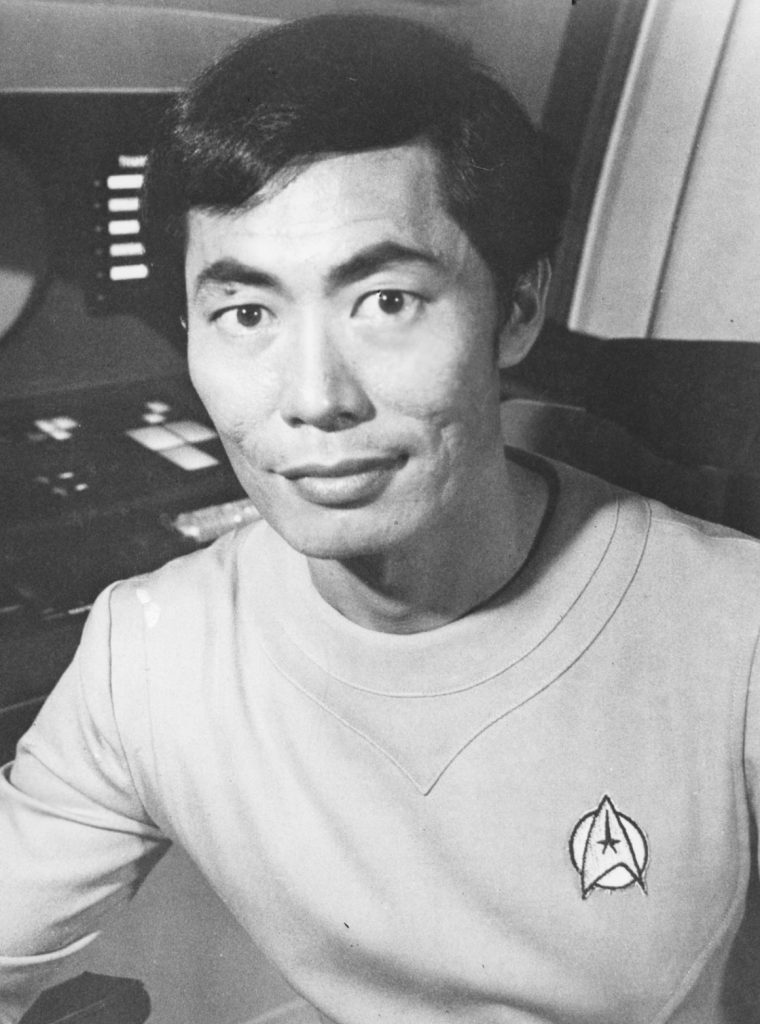
Takei reprised his role as U.S.S. Enterprise helmsman in “Star Trek: The Motion Picture,” the first of several big screen installments based on the 1960s TV series.
Yet, Takei’s fame does undoubtedly result from his role as Mr. Sulu on the original two “Star Trek” TV series (yes, that includes the TV cartoon) and several motion pictures, one of which saw him promoted to captain.
The UCLA grad — with bachelor’s and master’s degrees — possesses, however, a résumé that goes far beyond acting. While politics and activism have been part of his life for decades, he is busier than many people half his age, with publishing, social media, writing and executive producing movies, TV and plays a part of his quotidian routine.
Takei’s achievements over his 80-plus years include serving as the cultural chairman for the National JACL; serving on the board of trustees for the Japanese American National Museum; being appointed by Los Angeles Mayor Tom Bradley to the Southern California Rapid Transit District, upon which he served for 11 years; receiving a star on the Hollywood Walk of Fame; and being honored by the government of Japan with the Order of the Rising Sun, Gold Rays with Rosette.
But one word one won’t find associated with Takei: retirement. When the question of “why not retire?” was jokingly broached, Takei responded, “Retire to what? I don’t play golf.”
But while golf may not be a part of the lifelong exercise buff’s routine, Takei, whose health is still very good, added, “I enjoy what I do… . The things that I do, I get a visceral pleasure, as well as a sense of fulfillment, from doing it.”
Although the Takeis are comfortably ensconced in the tony Hancock Park section of Los Angeles, Takei says he and Brad also maintain a residence in New York City, which Takei says is used as base of operations for when he is doing theater work.
As an aside, Takei pointed out that the fact that he, as an Asian American, owns a home in his neighborhood is a debt owed from decades earlier to a renowned African-American musician and vocalist. Said Takei: “We owe it to Nat ‘King’ Cole.”
Turns out that in the 1950s when Cole wanted to buy the house on the next block, the “whites only” housing covenant of the time precluded that from happening. “He made an issue of it, and he fought it intensely in the courts, and he succeeded,” Takei said. “Because of him, the covenant was broken.”
While retirement holds no appeal to Takei, that doesn’t mean he eschews time for relaxation and reflection. The Takeis have a getaway in the town of Show Low, Ariz., elevation 6,500 feet. But even there, time is spent reading TV and film scripts. “It is singular,” Takei said. “I love sitting out on the deck, listening to the breeze.”
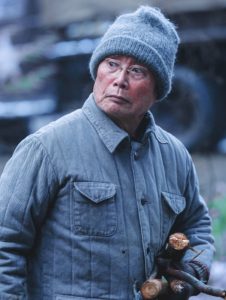
George Takei as Nobuhiro Yamato in AMC Network’s “The Terror: Infamy” (Photo: Ed Araquel/AMC)
The coming months could also prove to be singular, with Takei posed to swipe Stern’s mantle as the “king of all media.” There is the very real possibility he may be considered for Emmy Award nominations for his part as an actor and consultant in the AMC horror anthology series “The Terror: Infamy,” and Academy Award nominations for the indie pic “American” (see Pacific Citizen, May 31, 2019), in which he starred. [Editor’s note: “American” was not among the nominees for this category, which were announced after this issue went to the printer.]
Takei also has a graphic memoir, released in 2019, titled “They Called Us Enemy,” which retells in comic book form the story of his boyhood in two American-style concentration camps (Rohwer in Arkansas and Tule Lake in California) that he first relayed in his 1994 autobiography “To the Stars: The Autobiography of George Takei.”
He is also executive producing the adaptation of the best-selling novel “The Hotel at the Corner of Bitter and Sweet” by Jamie Ford with fellow producers Jennie Lew Tugend, Diane Quon and Lauren Weissman, and says that plans have been made for “Allegiance,” the Broadway play in which he starred and executive produced, to have a run in Tokyo, in Japanese, in 2021.
There are also plans to produce and star in a 30-minute TV series with the working title “The George Takei Show.” “It’s in the very early stages right now. In this business, many projects become a throw of the dice. It’s a risk of money, time, energy and talent. We’ll see what happens with it,” he said.
As for the best-case scenario of getting considered for Emmy and Oscar recognition, Takei said, “In this game, you approach everything with high hopes, but mindful also of the real prospects of the business.”
As an example, he cited the success of “They Called Us Enemy,” which was on the New York Times best-seller list for more than two months.
“You do everything with those aspirations, knowing full well that it is one in a million of that occurring. So, I’m realistically optimistic.”
Also “realistically optimistic” is “American’s” director, Richie Adams, who told the Pacific Citizen that “we have successfully entered the film into competition and are eagerly awaiting the results once the votes are in!”
After working with him on “American,” Adams was highly complimentary toward Takei. “George is a consummate professional. He is incredibly hard-working, was always very prepared and ready to get the job done and a tremendous joy to be around for all involved in the production,” Adams said.
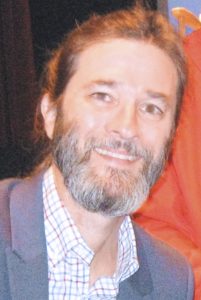
Richie Adams, who directed George Takei in “American,” said the actor was a “consummate professional.”
Echoing that sentiment was Jay Kuo, with whom Takei collaborated in turning the idea of “Allegiance” into a reality, who described him as “one of the hardest-working people I’ve ever met.”
Kuo also told the Pacific Citizen, “The crazy thing about George’s public persona and his private one is that they are much the same: He really is the magnanimous, caring, funny and dedicated champion that his fans know him to be. And once you get to know him, he becomes your uncle. It’s no wonder they call him ‘Uncle George.’ He even took time away to be with me and my family when my father passed away and was the officiant at our executive producer’s wedding.”
Actor Greg Watanabe, meantime, who appeared with Takei in the Broadway production of “Allegiance,” said he was “really taken by the fact of how much he considers ‘Allegiance’ to be a legacy project of his.”
Continued Watanabe, “Just that fact that he was so indefatigable about the promotion of that and talking about the ideas of the project, why it was important and what it represented to him personally and how much that that was genuinely his interest. He could talk — and would and will — be willing to talk anyone who would listen to anything about the JA community experience, especially the WWII incarceration experience, redress, everything. He’s really well-versed in the community, the different players involved and has very definite opinions about the things that have happened in our community’s history.”
When Takei was the keynote speaker at the San Diego JACL chapter’s annual gala in September, co-emcee and fellow Japanese American actor Tamlyn Tomita introduced him thusly: “He just simply opens up his heart as well as opens up his mind to new things, new things to learn and new things to learn how to love and advocate.”
Takei’s co-star in “The Terror: Infamy,” Derek Mio, recalled Takei’s contribution to that production. “He was always so encouraging to the entire cast,” said Mio, who admitted to being a bit star-struck by his acting senpai. “I had to kind of pinch myself periodically and just remind myself that I am working with George Takei, who is not just a film but also an American icon, a Japanese American icon, just a pillar in the community.
“I remember one time we were shooting a scene in the mess hall of the internment camp — and I think it’s the first time me and George have a one-on-one scene — and he’s talking to me, and I’m trying my best to stay in character, but I can’t help but think, ‘This is so crazy, I’m acting with George Takei right now.’ I had to fight so hard to remember my lines and stay in the moment.
“I told him after we cut, ‘George, this is so surreal,” Mio continued further. “I can’t believe I’m sitting here acting with you. You’re George Takei!’ He very kindly told me, ‘Well, someday people are going to say the same thing about you. They’re going to say, ‘I can’t believe I worked with Derek Mio.’”
One of the main points that Takei hammers home again and again is the issue of due process, one of the fundamental tenets of American jurisprudence that got pushed aside after the Dec. 7, 1941, attack on Pearl Harbor set the stage for President Franklin D. Roosevelt’s Executive Order 9066 and the mass removal and incarceration of thousands of Japanese Americans living on the U.S. West Coast.
“With no charges, no trial, no due process — which is the central pillar of our justice system — we were rounded up and imprisoned in barbed-wire concentration camps. We were innocent Americans who had nothing to do with Pearl Harbor. But we happened to look just like the people who bombed Pearl Harbor,” said Takei in his speech at the aforementioned gala in San Diego.
Ironically, Takei as an individual took a hit to his reputation — without due process — when he was accused in 2017 of inappropriate behavior during the feeding frenzy of the #MeToo movement that destroyed the careers of several high-profile executives, celebrities, politicians and media figures.
Although the allegations were subsequently discredited and Takei’s career did not get derailed, it’s something he wants to “put a big distance behind me.” What Takei would say about the incident was that what happened to him affected him “profoundly” on a personal level, especially from actions by some in the Japanese American community who jumped to a conclusion without due process, not unlike what happened to mainland Japanese Americans during WWII.
On a lesser scale of putting something cringe-worthy a “big distance” behind him, Takei did appear on a season of “Celebrity Apprentice 5,” where he had an opportunity to interact with the man who would a few short years later become president of the United States: Donald Trump. Even here, Takei managed to turn a negative into a positive.
“When he was campaigning for the Republican nomination, we were on Broadway with ‘Allegiance.’ He made a statement about ‘we’ve got to have a complete and total ban on having Muslims coming into the country,’” Takei recalled. “He’s clearly demonstrated that he is ignorant of history.”
To Takei, it was an echo of the same “sweeping generalization” toward Japanese Americans that “we were potential spies, saboteurs, Fifth Columnists” after Pearl Harbor. “I thought he would learn something from ‘Allegiance,’” he said. “I sent him a personal invitation as my guest to come see ‘Allegiance.’”
But Takei made that invitation public by talking about it on the sundry talk shows, and when the day came, he made sure there was a big sign on an aisle seat that read: This Seat Reserved for Mr. Donald Trump.
While Trump never showed up, Takei said during intermission that people were lining up to take photos and selfies with the sign, helping to both promote the show — and stick it to Trump.
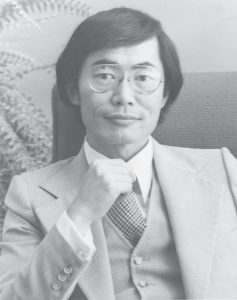
George Takei during his time in politics (Photo: Pacific Citizen)
If there was one area where Takei appears to wish he could have acted sooner was in the area of gay rights. But he had seen the negative effects what had happened to the careers of other gay Hollywood actors — he cited Tab Hunter as an example — whose homosexuality was revealed. To him, it was the tough choice between being able to work in his chosen field or be publicly true to himself.
“I stayed closeted all these years, actively campaigning on these other social justice issues — the civil rights movement, the peace movement during the Vietnam War, redress — 50 years ago, Stonewall happened and the gay liberation movement began, and I wanted to participate in that, but I had a career to protect, and I had to remain silent,” Takei said. “ So, the guilt that overlaid my silence while speaking out on these other issues was enormously heavy.”
It was that, plus then-California Gov. Arnold Schwarzenegger’s veto of the state’s marriage equality bill that helped push George and Brad to go public. “We decided, ‘All right, we’re going to come out’ and commit myself to activism there,’” Takei said.
Having helped produced “Allegiance” and with him taking an executive producer role on “The Hotel on the Corner of Bitter and Sweet,” Takei took an admonishing tone regarding who the onus is on to get projects like that made.
“Asians need to be on the production end,” Takei said. “We need more Asian Americans taking the leadership in getting projects initiated. … Asians need to start taking the initiative.
“There are many people in the Asian American community that should be, that are in a capacity where they can take that initiating role. But they don’t. So, we who advocate that have to be the ones to do that, to serve as the groundbreakers.”
Noting that “African-Americans support their artists,” Takei also lamented how Japanese Americans need to support their fellow Japanese American artists who take that initiative.
“I don’t want to see a Philip Kan Gotanda play with a Japanese American cast being attended by a only a sprinkle of Japanese American faces,” he said.
“Society is changing. What an arc my life has had,” said Takei, reflecting on a life of growing up in a barb wire-enclosed camp to becoming a celebrated actor to being in a legally recognized marriage to another man.
Asked what he might have done differently or what sort of advice he wished an older, wiser mentor could have given a younger George Takei, he said, “I’ve enjoyed my life. I’ve enjoyed discoveries that I’ve made. I’ve enjoyed what I’ve learned and I’ve enjoyed the challenges that I’ve had. You can’t live life saying, ‘I shoulda, woulda, coulda,’” Takei said.
“Life is rich because you deal with the challenges, the disappointments, the horrors, and you overcome and find new things to engage you. I’ve had a challenging life. I’ve had a fulfilling life. I’ve had an enjoyable life. I don’t have those regrets of ‘If someone had done something for me’ or ‘If I had done this or that.’ I’m looking forward to the rest of the challenges.
“I know that I’ve celebrated more birthdays than I will be having,” Takei continued. “I’m mindful of that. I’m not living with ‘The end is coming.’ I’m enjoying the challenges that I’m having today and some of the successes and maybe some of the disappointments. That’s all part of the game. But that’s what makes life worth living.”
It was at this point where Brad Takei interjected, “If George had had that wise mentor, he would have said, ‘George, make sure that at some stage in your career, you get a Brad in your life that can make sure you can stay on schedule.’”
“That’s true,” George Takei said. “I can do what I do better because of Brad.”
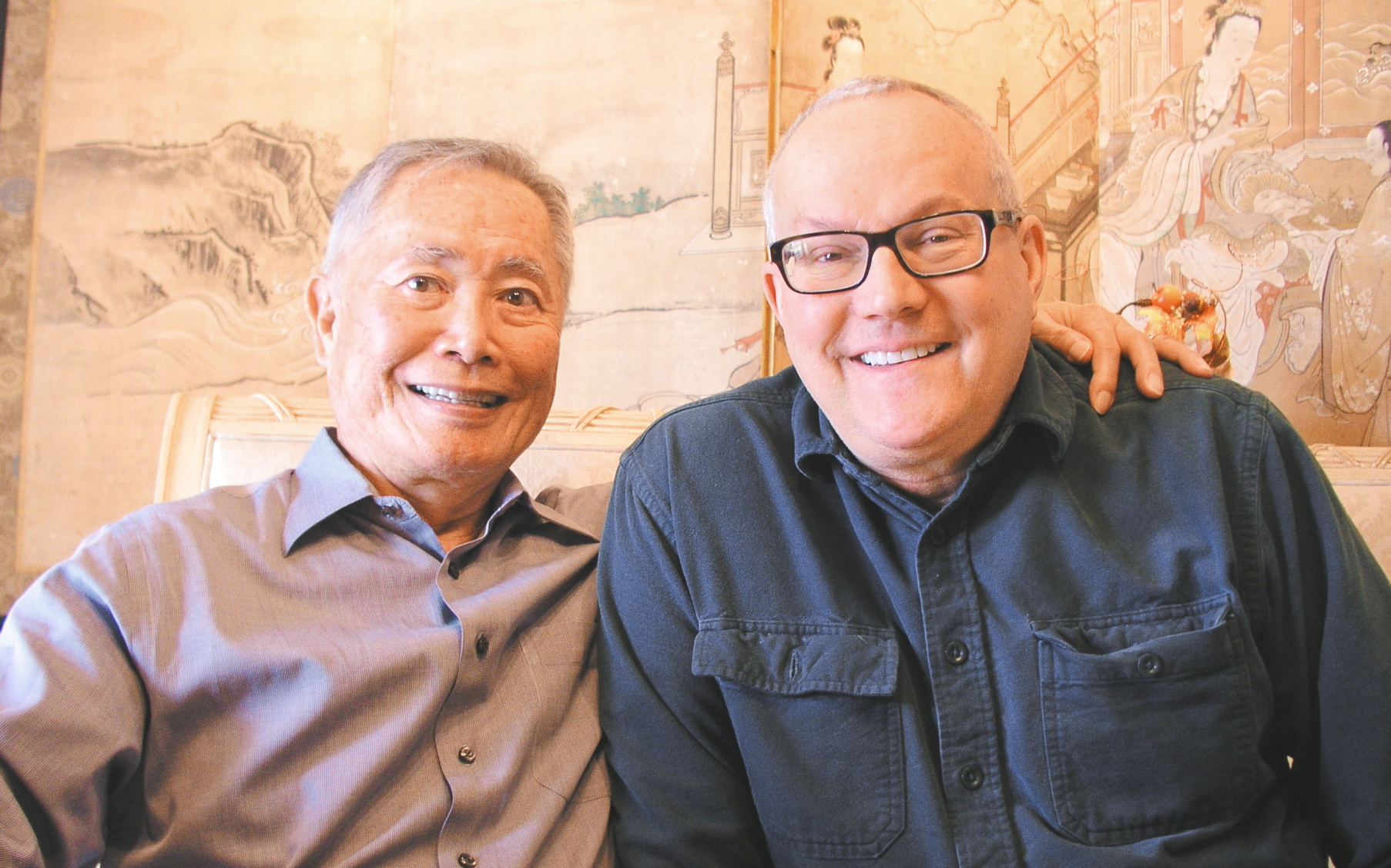
George and Brad Takei at their home in Los Angeles (P.C. Photo: George Toshio Johnston)




